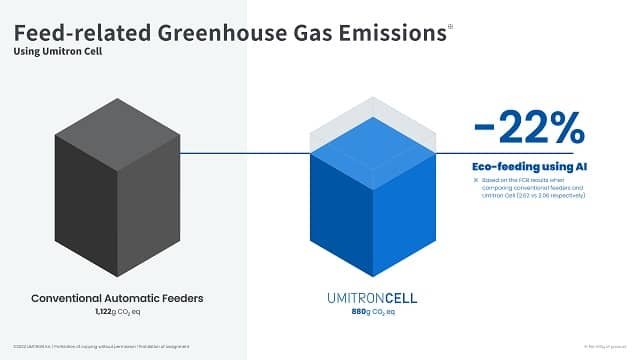UMITRON K.K. (Location: Shinagawa-Ku, Tokyo, Representative: Ken Fujiwara, hereafter UMITRON) recently assessed the environmental footprint of their ASC-certified red sea bream sold under their sustainability brand, Umi to Sachi. The life cycle assessment (*1) measured greenhouse gas (GHG) emissions produced across the product’s value chain, from raw material procurement to end-use and disposal. The analysis also showed that Umitron Cell, Umitron’s AI-powered smart feeder, reduced feed-related GHG emissions by 20% compared to conventional automatic feeders.
Details of the life cycle assessment
■ GHG emissions produced during the life cycle of Umi to Sachi’s ASC certified red sea bream (per 100g of product)

The life cycle assessment showed that GHG emissions of Umi to Sachi’s ASC-certified red sea bream were approximately 1,048g CO2 eq per 100 g of product (*2). The analysis results also showed that procurement of raw materials, mainly for fish feed, accounted for more than 80% of the product’s total GHG emissions.
■ Reduction of GHG emissions related to feed by UMITRON CELL (compared to conventional automatic feeders, per 100g of product)

When compared against conventional automatic feeders, Umitron Cell was able to decrease GHG emissions by about 20% (240g CO2 per 100g of product (*3). This is because it uses an AI-based Fish Appetite Index (FAI) to analyze fish behavior during feeding and can minimize the amount of feed wastage in the water.
■ Comparison of GHG emissions between food products (per 100g of product)

The 20% reduction roughly translates to about 1 hour of home air conditioner use. When compared against the carbon footprint for beef produced in Japan, Umi to Sachi’s product had a difference of 1,360g CO2 eq per 100g of product (approximately 5.7 hours of home air conditioner use). In the future, Umitron is planning to add more data on GHG reductions for products farmed using Umitron Cell.
Future initiatives
In addition to its continuous journey to develop technologies to improve the farm working environment and the efficiency of fish production, Umitron sees the potential to also contribute to environmental sustainability by helping to reduce the aquaculture industry’s carbon footprint. Furthermore, based on the positive results obtained from this life cycle assessment, the company also plans to include the carbon footprint of the products sold under their Umi to Sachi brand. Looking ahead, we want to play a more central role in achieving a low-carbon economy by encouraging consumers to be more sustainability-focused when shopping and choosing more eco-friendly products.
About UMITRON
UMITRON is a Singapore and Japan-based deep tech company aiming to solve worldwide food and environmental problems by empowering aquaculture with technology to achieve a more sustainable footprint. Over the past few years, we’ve developed products exclusively for the industry using a combination of IoT, satellite remote sensing and AI technology.
We are committed to achieving industry growth by improving the working environment and ensuring a safe and stable supply of marine resources with a strong focus on marine conservation and protection. Ultimately, we aim to realize our mission to ‘install Sustainable Aquaculture on Earth’.
Website:https://umitron.com/ja/index.html
Notes:
(*1) A method to assess the environmental impact of a product by breaking it down by each process, from raw material procurement, production, processing, distribution, sales, and disposal. The results were obtained in 2022 and reviewed by third-party company Cuon Crop K.K.
(*2) CO2 eq k(Carbon dioxide equivalent): Value converted to its CO2 equivalent using the Global Warming Potential (GWP).
(*3) Based on past proof-of-concept (POC) trials conducted by Umitron and red sea bream farmers in Japan.
Editor at the digital magazine AquaHoy. He holds a degree in Aquaculture Biology from the National University of Santa (UNS) and a Master’s degree in Science and Innovation Management from the Polytechnic University of Valencia, with postgraduate diplomas in Business Innovation and Innovation Management. He possesses extensive experience in the aquaculture and fisheries sector, having led the Fisheries Innovation Unit of the National Program for Innovation in Fisheries and Aquaculture (PNIPA). He has served as a senior consultant in technology watch, an innovation project formulator and advisor, and a lecturer at UNS. He is a member of the Peruvian College of Biologists and was recognized by the World Aquaculture Society (WAS) in 2016 for his contribution to aquaculture.
